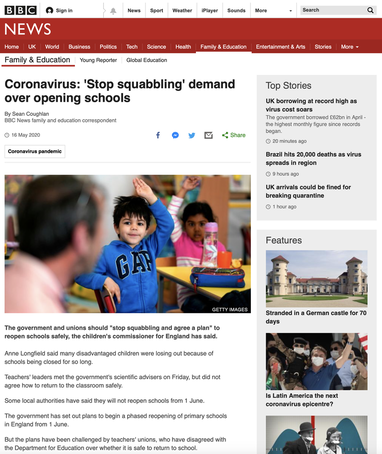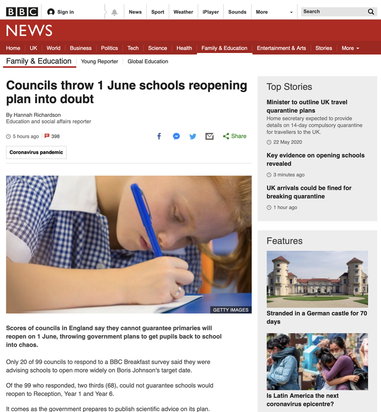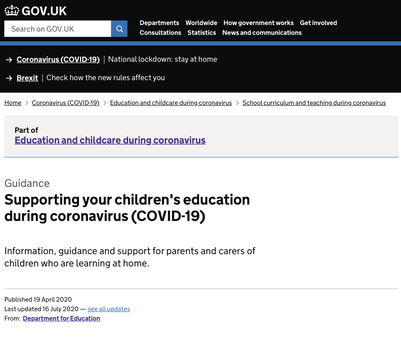|
by Douglas Silas, specialist SEN solicitor Here's my update again for this week. Like last week, I am going to do the first section of this update as an animated video and text. That being said, somebody has kindly pointed out to me that it takes more time for them to listen to the update then to read it, because the animated voice goes too slowly. So I have taken this on board and have tried to speed up the voice this week. I hope that this helps people again. 1. What has happened this week? Once more, in education news, the issue was still about when schools would reopen and how they would reopen… There was initially an article entitled: "Coronavirus: 'Stop squabbling’ demand over opening schools", which said: “The government and unions should "stop squabbling and agree a plan" to reopen schools safely, the children's commissioner for England has said. Anne Longfield said many disadvantaged children were losing out because of schools being closed for so long. Teachers' leaders met the government's scientific advisers on Friday, but did not agree how to return to the classroom safely. Some local authorities have said they will not reopen schools from 1 June. The government has set out plans to begin a phased reopening of primary schools in England from 1 June. But the plans have been challenged by teachers' unions, who have disagreed with the Department for Education over whether it is safe to return to school. Schools need to open "as quickly as possible", Ms Longfield has said, as she called for stronger safety measures to be introduced, such as regular testing for pupils and teachers, managed interaction between adults and deep cleaning of facilities. She said that, without a vaccine, schools will never be 100% safe, as she urged the government and unions to work together "in the interests of children". Schools have been closed by the coronavirus for most pupils since 20 March, staying open only for the children of key workers and vulnerable children. Ms Longfield said that deprived and vulnerable children would suffer most from missing school and there was a growing "disadvantage gap". She backed plans to bring back children in Reception, Year 1 and Year 6. Kevin Courtney, co-leader of the UK's biggest teaching union, the National Education Union (NEU), told BBC Breakfast the meeting with scientific advisers on Friday was a "step forward" but that more cooperation was needed between the government and unions to "find a safe way back". The NEU has drawn up five tests which, it says, the government should meet before schools reopen. These include regular testing, protection for vulnerable staff and a national plan for social distancing. Mr Courtney called on the government to set up a task force with unions to plan a safe way of getting children back to school. Liverpool's schools will not reopen until mid-June "at the very least", the city's council said. Hartlepool Borough Council has also challenged the government's timetable, saying schools will not reopen at the start of next month "given that coronavirus cases locally continue to rise". However, Andy Preston, mayor of Middlesborough told BBC Breakfast that, although children and teachers have to be kept safe, "no-one can ever be given a 100% guarantee", stressing the impact that school closures were having on deprived children. While many primary schools in England are under local authority control, others are run by academy trusts. Steve Chalke, founder of the Oasis Trust, which has 35 primary schools across the country, said opposition to reopening fails to recognise the harm to disadvantaged children from missing school. England is the only UK nation to set a date for schools to start to return. Teachers have said they are worried about the emotional distress returning to the classroom could have on staff and pupils. Becky, who has asked her surname not be used, teaches Reception and Year 1 at a primary school in Birmingham. Speaking about the effect new rules will have on children, she said: "They won't be able to play with toys, play with their friends. When they're distressed and upset, how can we comfort them from a distance? It will cause them damage." Her comments were echoed by parent Claire Dhillon-Burrows, from Hertford, who has three children, one of whom is four years old and is due to return to school on 1 June. "He doesn't know how to social distance and still sucks his thumb," she said, asking why teachers were being expected "to work a social distancing miracle with such young children". The British Medical Association has backed teachers' unions by saying Covid-19 infection rates are too high for England's schools to reopen. The infection rate in the UK - the so-called "R-number" - has crept up from between 0.5 and 0.9 to between 0.7 and 1.0. The number needs to be kept below one in order to stay in control and any increase in the number limits the ability of politicians to lift lockdown measures. Prof Sir Mark Walport, the government's former government chief scientific adviser, said the rise in the R-number - albeit "relatively small" - is concerning and illustrates how carefully social distancing measures need to be relaxed. "There's no question that the prospect of a second wave still exists," he told BBC Radio 4's Today programme. Speaking about schools reopening, Prof Walport said schools have returned "in a very cautious fashion" in Denmark for the past month and the country's R-number has reduced. A Department for Education spokeswoman said: "Getting children back to school and nurseries is in their best interests and all those working in education have a duty to work together to do so. "We welcome the children commissioner's support for a phased return of children to primary school with many of the measures she raises, like staggering drop-off and pick-up times, keeping children in smaller groups and regular hand washing, already in train." Schools in Wales will not be going back on 1 June and it is not expected that schools in Scotland or Northern Ireland will go back before the summer break. By the end of the week though, an article appeared entitled: "Councils throw 1 June reopening plan into doubt", which said: Scores of councils in England say they cannot guarantee primaries will reopen on 1 June, throwing government plans to get pupils back to school into chaos. Only 20 of 99 councils to respond to a BBC Breakfast survey said they were advising schools to open more widely on Boris Johnson's target date. Of the 99 who responded, two thirds (68), could not guarantee schools would reopen to Reception, Year 1 and Year 6. It comes as the government prepares to publish scientific advice on its plan. Ministers have been insisting that they would only be calling on schools in England to reopen in June if the scientific advice said it was safe to do so. Teaching unions, heads and politicians have been calling for that advice to be made public. BBC Breakfast carried out a snap-shot survey of the 150 local authorities that oversee primary schools over the past 48 hours. It also showed: - 14 local authorities, mainly in the north-west of England, said they would not be advising schools to open their doors to more pupils - 11 said they were still considering the issue - 54 leaving the decision up to individual schools - The local authorities which have said they will not open on 1 June include: Blackburn, Bury, Calderdale, Cheshire East, Cheshire West, East Riding, Knowsley, Newcastle City, Rochdale, Stockport, Trafford and Wirral. It is the head teachers and the governing bodies on the ground who need to make arrangements for social distancing or keeping children within small groups to limit the potential spread of infection. Schools across England have been open to small numbers of vulnerable pupils and the children of key workers since they formally closed at the end of March. But the prime minister announced plans for a phased reopening of primaries from 1 June, when he set out the government's plans to move gradually out of lockdown measures on 10 May. Almost immediately, teaching unions and head teachers warned of safety concerns and practicalities in many schools which, they argued, made safety measures unfeasible. And, with scientific evidence on the way the virus is spread by children limited, there are concerns the wider opening of schools could lead to a second spike in Covid-19. Teaching unions also called for a more regional approach, with local authorities being given the final call. Education Secretary Gavin Williamson made a plea for the sector to let children get back to school, and a string of ministers lined up to try to persuade parents, many of whom are concerned about a return, that schools would be safe. But, as opposition continued to grow, there has been a softening of the government's approach. On Wednesday, Justice Minister Robert Buckland, said the government was prepared to listen to the concerns of head teachers and council leaders, and hinted it might step back from the 1 June date. He also acknowledged schools would not reopen in a uniform way across England after half term. A spokesman for the Department for Education said: "We want children back in schools as soon as possible because being with their teachers and friends is so important for their education and their well-being." He added that plans for a cautious, phased return of some children was based on the best scientific and medical advice and insisted the department had been engaging closely with a range of organisations including the teaching unions. But Paul Whiteman, general secretary of the National Association of Head Teachers, said support for a fixed date for school return was vanishing quickly. "What is needed now is local flexibility to determine when it is right for schools to open up to more pupils." Councillor Judith Blake, chair of the Local Government Association's children and young people board, backed calls for decisions to be made locally. "As there are different Covid-19 infection rates around the country, schools and councils must be able to work together to decide how and when schools open to more children," said Ms Blake. Councils also needed crucial testing data to be shared with them to boost confidence about reopening schools among teachers and parents, along with powers to manage outbreaks in schools, care homes and the community, she argued. Meanwhile Unison, which represents many school support staff, said members had little confidence in government reassurances that English schools will be safe to open to more pupils from 1 June. An overwhelming 96% of 42,000 teaching assistants, cleaners, technicians and office staff surveyed by the union, said they felt ministers had not put safety first in their reopening plans. On Thursday the governments of Scotland and Northern Ireland announced plans for a phased return to school for pupils, starting in August. Wales has not yet set a date. Notwithstanding this though, the Government has now issued guidance entitled: “Supporting your children's education during coronavirus (COVID-19)” which states as follows: From the week beginning 1 June 2020, at the earliest, we’ll be asking: - primary schools and childcare providers to bring back children in nursery, reception, year 1 and year 6 - secondary schools to offer some face-to-face support to supplement the remote education of year 10 children who are due to take GCSEs next year Vulnerable children and the children of critical workers continue to be eligible to attend, and we encourage them to do so where appropriate. Other children will continue to be supported to learn at home. Further information on which children can attend school is available. This page and information for teachers will be updated regularly to include further resources and reflect the latest information and developments. While staying at home due to coronavirus, parents and carers may be worried about their children’s development and the effect of missing school or nursery. No one expects parents to act as teachers, or to provide the activities and feedback that a school or nursery would. Parents and carers should do their best to help children and support their learning while dealing with other demands. Alongside any work your children receive from school, you can try using online educational resources covering various subjects and age groups. These have been recommended by teachers and school leaders. Educational programmes to help children learn at home are available from the BBC. Have regular conversations about staying safe online and tell your child to speak to you if they come across something worrying online. Mental health and wellbeing. The change of routine and staying at home may make this a difficult time for some children. Public Health England has published advice on how to support your children’s wellbeing during the coronavirus outbreak. 2. What does this all mean? I feel that I am now beginning to repeat myself in this section in these weekly updates. This is because it again seems a very difficult question to answer as I can see positives and negatives on both sides. However, as we get closer to the end of the school year (with half–term next week), I do wonder what will happen if we try to get some children with SEN back in the classroom for only a short period of time before they have to break again for the long summer holidays? 3. Where can I find further information? There isn't really much more that I can say in this update now. However, as I always like to do at the end of my updates, I would again remind you of the very useful resources and information provided on the following websites: - IPSEA - Council for Disabled Children - Contact - Scope - Special Needs Jungle I would also highlight again the fact that you can now get digital copies of the magazines: SEN Magazine and Autism Eye which are both very helpful to any parents or professionals involved with children/young people with SEN. Remember also, that there are other videos on this website, especially the one at the top of this page which explains the coronavirus and its effect clearly to children. Keep safe until next week. With best wishes Douglas P.S I understand that there are a number of educational or other useful resources now on the web - I would be very grateful if you could let me know of any that people are finding useful, so that I can direct others to them. P.P.S. I also want to highlight again the fact that there are currently a lot of scams out there, both online and through texts/WhatsApps. Please be extremely careful and help yourself and others not to become victims. You can learn more at: www.FriendsAgainstScams.org.uk. Comments are closed.
|
Archive
March 2022
|
© Douglas Silas Solicitors 2005-24
Authorised and Regulated by the Solicitors Regulation Authority (SRA no: 643718)
‘Douglas Silas Solicitors’ is the trading name of ‘Douglas Silas Solicitors Limited’, a limited company registered in England & Wales (company no: 10689991), whose registered office is Gable House, 239 Regents Park Road, Finchley, London, United Kingdom, N3 3LF. A list of members/directors may be inspected at our office.
Authorised and Regulated by the Solicitors Regulation Authority (SRA no: 643718)
‘Douglas Silas Solicitors’ is the trading name of ‘Douglas Silas Solicitors Limited’, a limited company registered in England & Wales (company no: 10689991), whose registered office is Gable House, 239 Regents Park Road, Finchley, London, United Kingdom, N3 3LF. A list of members/directors may be inspected at our office.





 RSS Feed
RSS Feed







